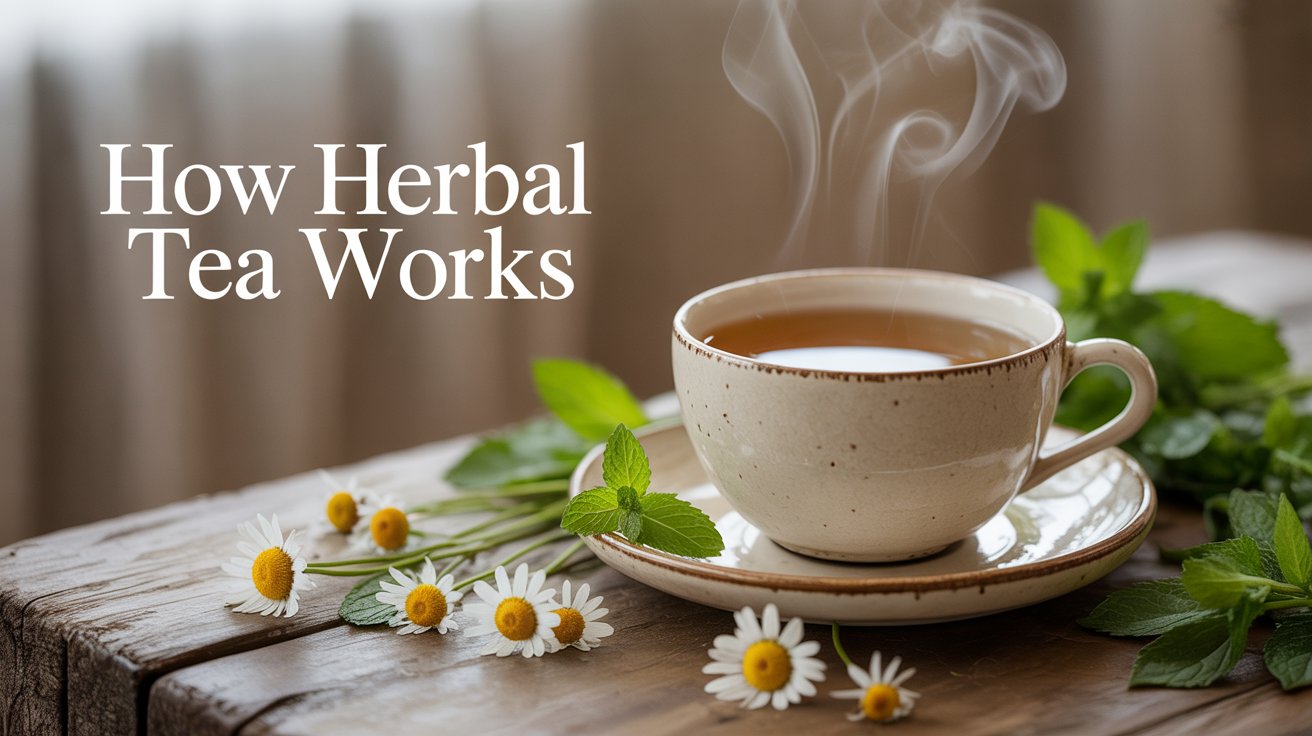For centuries, herbal tea has been more than a comforting beverage it’s been a cornerstone of natural medicine. But in 2025, its benefits are finally being backed by modern science.
Unlike traditional teas made from Camellia sinensis (green, black, or oolong), herbal teas are caffeine-free infusions of herbs, roots, flowers, and spices. Each ingredient interacts uniquely with your body helping regulate digestion, metabolism, and even stress levels.
So, how does herbal tea really work inside your body? Let’s explore what recent studies reveal about its biological mechanisms and practical benefits.
How Herbal Tea Works in the Body
Herbal teas deliver bioactive compounds such as polyphenols, flavonoids, essential oils, and antioxidants that interact with your digestive and nervous systems.
Here’s how these components function:
-
Supports Digestion: Compounds like menthol (in peppermint) and gingerol (in ginger) relax the gut muscles, easing bloating and cramping.
-
Boosts Metabolism: Catechins and flavonoids help activate thermogenesis the process of burning calories to produce energy.
-
Reduces Inflammation: Curcumin (from turmeric) and chamazulene (from chamomile) calm intestinal inflammation.
-
Encourages Relaxation: Naturally caffeine-free herbs like lemon balm and lavender regulate stress hormones and improve sleep quality.
-
Improves Hydration: Because herbal teas are water-based, they keep your body hydrated, aiding digestion and weight control.
2024 clinical data from the Journal of Functional Nutrition confirms that herbal tea polyphenols improve digestive efficiency by up to 18% and promote better microbiome balance compared to plain water.
Key Benefits of Herbal Tea (Explained by Science and Tradition)
Let’s go deeper into the major benefits and how herbal teas deliver them:
1. Herbal Tea for Digestion and Gut Health
A healthy gut is essential for overall wellness, immunity, and energy. Herbal teas like chamomile, ginger, and fennel support gut health by:
-
Increasing bile flow for better fat digestion.
-
Relaxing gastrointestinal muscles to ease cramps and bloating.
-
Feeding beneficial gut bacteria.
Tip: Create a visual infographic showing “Top Herbal Teas for Gut Health” with icons for chamomile, ginger, and peppermint for higher engagement.
2. Herbal Tea for Weight Loss and Metabolism
Herbal teas stimulate your body’s natural metabolism rather than forcing quick results. Green tea, ginger, and specialized slimming blends like All Day Slimming Tea (2025 Formula) help:
-
Enhance fat oxidation.
-
Reduce sugar cravings.
-
Increase energy levels naturally.
2025 update: The American Journal of Clinical Metabolism found that catechin-rich teas increase calorie expenditure by 5–8% daily when combined with moderate physical activity.
3. Herbal Tea for Relaxation and Stress Relief
Herbal teas influence the gut-brain connection, which explains their relaxing effects. Teas like chamomile, lavender, and lemon balm lower cortisol (the stress hormone) and promote calmness.
These teas help you unwind, improve sleep, and reduce emotional eating a key factor in maintaining a healthy weight.
Best time to drink: Evening or before bed for relaxation and better digestion.
4. Herbal Tea for Detox and Immunity
Herbal detox teas work by supporting the liver, kidneys, and lymphatic system the body’s natural detox centers.
Teas such as hibiscus, turmeric, and dandelion root:
-
Flush out toxins.
-
Protect cells from oxidative stress.
-
Strengthen the immune system.
Visual prompt suggestion: Add a chart comparing antioxidant levels of hibiscus, turmeric, and green tea to boost SEO snippet value.
Does Herbal Tea Really Work? (Science vs. Tradition)
This is one of the most common questions and the answer lies in both modern studies and centuries-old wisdom.
-
Scientific Evidence (2024–2025):
-
Green tea catechins improve fat metabolism.
-
Chamomile flavonoids reduce intestinal inflammation.
-
Turmeric curcumin supports detox and immune health.
-
-
Traditional Use:
Herbal teas have been used in Ayurveda, Traditional Chinese Medicine, and European herbalism for digestive and metabolic balance for over 2,000 years.
In short, herbal tea works because its natural compounds support your body’s existing systems rather than forcing artificial effects.
Choosing the Right Herbal Tea for Your Goals
Not all herbal teas are created equal. Match your choice to your wellness goals:
| Goal | Recommended Herbal Teas | Key Function |
|---|---|---|
| Digestion | Peppermint, Ginger, Chamomile | Relaxes gut & reduces bloating |
| Weight Loss | Green Tea, All Day Slimming Tea | Boosts metabolism |
| Relaxation | Lemon Balm, Lavender, Chamomile | Lowers stress hormones |
| Detox & Immunity | Hibiscus, Turmeric, Dandelion | Antioxidant & liver support |
Visual tip: Add this table as a featured infographic titled “Choose Your Herbal Tea by Goal (2025 Guide)” for SEO snippets.
How to Use Herbal Tea Effectively
For optimal benefits, consistency and timing matter more than quantity.
Morning:
-
Drink green tea or a slimming blend to jump-start metabolism.
After Meals:
-
Sip ginger or peppermint tea for smoother digestion.
Evening:
-
Opt for chamomile or lemon balm tea to relax and restore balance.
Pro tip: Join a 7-Day Slimming Tea Challenge or follow a structured plan like All Day Slimming Tea (2025) to pair hydration with metabolism and gut health benefits.
Does Herbal Tea Replace Water?
While herbal tea hydrates the body, it shouldn’t entirely replace water. The ideal ratio for most people is 70% water + 30% herbal tea, ensuring balanced hydration and nutrient intake.
Conclusion: How Herbal Tea Truly Works (2025 Summary)
Herbal tea works by harnessing nature’s biochemistry polyphenols, antioxidants, and essential oils to support your body’s natural processes.
It doesn’t promise instant results, but with regular use, it can:
-
Improve digestion
-
Balance metabolism
-
Ease stress
-
Strengthen immunity
-
Encourage sustainable weight management
As of 2025, herbal tea remains one of the most evidence-supported and enjoyable ways to nurture long-term wellness cup by cup.


Leave a Reply